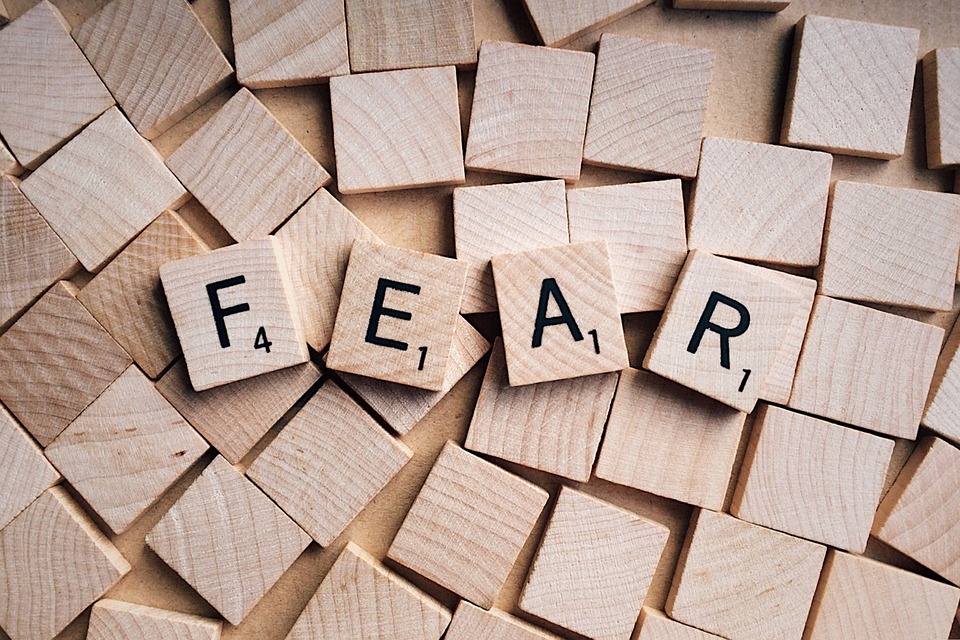Either Stay Scared…Or Use These 7 Tips to Overcome Your Fears
Fear is a basic human emotion. Its purpose is to keep us safe. When we’re afraid, there’s a good reason. Back in the day, that fear would keep us from being eaten by tigers or getting too close to a dangerous fire. To stay alive, we needed to respond properly to threats and the fear that went with them. The threats are different now, but we still respond with built-in skills. You can use these 7 tips to overcome your fears and have a more peaceful life.
Things seem scarier these days. There’s so much we can’t control and so many unknowns threats. The fear they bring can quickly get overwhelming. Like Mother Teresa, one could work to change the triggering fear factors, but that’s very difficult and can take a lifetime of effort without too much progress. Shutting out the world to escape or minimize the triggers cuts us off from each other and all the rest of the good stuff.
You do have a choice: either stay scared or use these 7 tips to overcome your fears.
I get it: there are things that are just too scary. My wife, for example, fears flying in airplanes for her own good reasons. The convenience of air travel isn’t always worth the stress and anxiety it causes her. When I respond with statistics about air travel safety, I bet you can guess it doesn’t help! But when I respond with empathy?
First Tip: Ask for Empathy
 Empathy from someone who cares for you is huge, especially with your fear. It takes courage to share our fears with someone else, even someone who’s close to us, because of doubts about the other person’s response to our fear. Will they see us as needy? Will they think our fear is silly? This is someone who says they care for me! What if I share my fear and they just laugh in my face? Empathy from someone of really cares crushes our doubt.
Empathy from someone who cares for you is huge, especially with your fear. It takes courage to share our fears with someone else, even someone who’s close to us, because of doubts about the other person’s response to our fear. Will they see us as needy? Will they think our fear is silly? This is someone who says they care for me! What if I share my fear and they just laugh in my face? Empathy from someone of really cares crushes our doubt.
Here are exact words you can use if you want empathy from someone who cares for you:
“I know you care for me, and I want you to understand something about me that makes me really scared, but when I tell you this, I also want you to show me that you understand my fear and most importantly be judgment-neutral about it. Will you do that for me?”
Understanding you without judging you is how someone who cares can give you empathy when you share your fear. You deserve to be cared for by someone – or many people! – who can do that for you. And, doing this with someone who’s empathetic is great practice for when the actual scary triggers happen in real life.
Second Tip: Recognize that Your Fear is a Tool
There’s a reason you feel scared. You can ask for judgment-neutral empathy for your fear, which gives you safety to talk more about why you are afraid. Now, as you remember that your human fear response is built-in, you can begin to talk about how your fear keeps you safe.
Sometimes, the reasons for fear are obvious, like that hungry tiger. At other times, the fear we feel about something might be hiding a bigger danger. When we accept our physiological response – the thing we feel as fear – and give ourselves a chance to investigate what this feeling is trying to tell us, the results can be surprising.
As you talk about the fear, in safety, you can be a bit more objective and maybe a bit curious – more so than if you were trying to face that fear in the wild. It’s like a test-drive of some new skill in your very own avatar.
Third Tip: Use the Tool to Dig In
Like a martial artist, the stress and anxiety that come along with your fear become the fuel that powers you as you wield your new fear-busting skill. You use that skill to discover the meaning of your fear.
Wait a minute: the meaning of my fear?
Yes: meaning. This is only a test, right? Your empathetic, judgment-neutral friend has your back. It’s safe to talk about what scares you and, while the fear is still there, the real life trigger isn’t.
A loose, hungry tiger is clear fear. It’s easy to understand the danger. That’s the meaning of tiger fear. But what about more complex fears, like being scared of flying? Or all those fears other people tell us are “irrational?” Remember, our fear is a tool, and the energy in that scary feeling powers that tool. Our job is to make meaning of the fear…to dig into what we feel to understand ourselves better and find the meaning in why we feel afraid.
It’s not pleasant, feeling afraid, but that fear is powerful energy. Use that energy! Here’s how. Tell yourself: “Even though I’m here in safety with someone who shows me empathy, I’m also so scared, and I want to discover the meaning in this fear!”
Often, that simple desire is enough to unlock meaning in fear. Why? Because it’s safe…to want to know why. You faced your fear – in your imagination – in a safe, empathetic way that can open up new possibilities for what the fear is telling you. The meaning of that fear is now available to you. Now “the airplane might crash” is just one possibility, not the only outcome. you have begun to find the meaning in that fear.
Fourth Tip: The Practice of Wash Rinse Repeat

Please be gentle. You may not find the whole meaning in your fear all at once. If you feel a sense of incompletion after you explore your fear, that’s meaning, too! It means that you’ve started the process of digging in, but there’s more work to do. Congratulate yourself, but please don’t push yourself if you need a rest. Rest is so important!
Because this practice takes time – because the expectations of our instant-on era don’t always allow us to accomplish this work in ways that serve us best – there’s a temptation to think we’ve failed if we don’t hit a home run every time we swing at a fear fastball. Don’t be tempted to give up: in this work, it’s all good. There are no penalties for striking out.
Take a breath or a breather, and know that you can pick up the fear tool again when you’re ready…later today, tomorrow, next month: it’s up to you. This process – ask for empathy, deploy your skills, find the meaning – is one you can practice to hone your skills. That’s how it works.
Fifth Tip: Trigger the Fear
As you practice the first four tips, your skills – asking for empathy, safely exploring your fear as a tool, uncovering the meaning connected to your fear, and repeating the process – will all begin to feel natural to you. Practice just does that. Athletes and combat warriors, dancers, actors, and performers, artists and salespeople, even accountants, coders, and analysts practice skills so that they begin to feel built-in and become automatic, accurate, and infallible. Practice gets us closer to perfection, but it doesn’t take perfection to deal effectively with fear!
The point of practice is to be able to deploy our skills without the effort of thinking about them. Just like fear can grip us without a moment’s notice, practice lets us wield exactly the right skill automatically. Practice, of course, isn’t exactly real life, but the practice of skillful action under controlled circumstances (tips one through four above!) prepares us to meet real life with a confident edge.
So, now that you’ve spent time in practice, and while you are still in safety, give yourself a test: trigger a specific fear. Thanks to other built-in skills like imagination, it’s easy to do this. But, thanks to your practice, it’s possible that just imagining yourself in a situation that triggers the fear is no longer enough! That means your skills are getting powerful.
When imagination isn’t enough to trigger your fears, you can use an outside trigger that’s still quite safe. For example, you can easily trigger fear with music, and you can do this on your own. Find a piece of music that scares you and a safe place to listen and let that music play. When fear hits, practice your skills. There’s more about how music works here and here.
If you’re more a visual person, watch a movie that scares you in the same way as the fear you want to overcome. Get creative here! Provided that a safe situation can trigger you, you’re doing it right.
Then…practice your skills!
 Sixth Tip: Fear in Real Life
Sixth Tip: Fear in Real Life
Unless you’re ultra-rich or live an ascetic life, it’s hard to be really successful at avoiding fear in real life. Even billionaires have issues, as does The Dali Llama. But practice helps, as you now know. When you feel proficient triggering your fear in safety, you’re ready to try out a real-life trigger.
Working up to this point might take time, so continue to be gentle with yourself. For example, I’ve met people who were afraid of flying who added flying lessons to their practice. Their fear was the energy they needed to become pilots, and that practice caused their fear to lose its debilitating grip.
What’s the trigger for your fear in real life? How will you respond when life triggers you with that fear? Let your imagination walk through this encounter and deploy your new skills, which are now becoming built-in, to meet the imagined real-life trigger. Observe your imagination’s response. Do you feel that you’ve uncovered the true meaning in your fear? Do you have a strong grip on that fear and its meaning? Gamify this process, and notice that, as you repeat your imaginary encounter, your training begins to automatically adapt to meet the threat.
When you feel ready, take your practice into a real-life situation. If it feels right, ask your empathetic friend to accompany you. It won’t be hard to find the trigger out there in the world but, like a trained warrior, you’re ready to meet it. Your friend can provide cover and safety if you need to retreat, but there’s a much better chance that you’ve got this. You’ve done the work. You’re ready.
Seventh Tip: Teach Others
By this time you have started to understand that there’s no real magic in overcoming fear. Instead, a skillful response to fear is how human beings survive and thrive. The truth is that, once a fear is overcome, some new fear just shows up to take its place, and the process begins again. Practice shortens the time and lessens the effort it takes to respond to those new fears, and there are plenty of unknown triggers in this world to be afraid of! You will begin to welcome that fact, too.
Understand that this practice is the very opposite of what you may see in the media. Instead of becoming more and more fearful, and being sucked into doing things that break things and hurt people (including you!), this practice strengthens your very natural ability (to overcome your fear) without first having to change the world. These days, that’s a good thing.
Is it fun? It can be, especially when you teach others how to overcome their fears. Some of the most rewarding moments in my life have happened when a student lights up in either understanding or empathy. Teach someone what you now know about how to overcome fear with these tips, and watch what happens. A small positive change in the world around you is still a change in the world.
To Learn How to Overcome Your Fears and Strengthen Your Practice
Think carefully: you may already know how to overcome your fears. These skills are built-in, and they improve with practice. You can work alongside us to help supercharge your process. Contact us here.
Ready for a deeper dive? The Musimorphic Quest, a fully-mentored online active-learning experience will immerse you in practical ways to meet life’s challenges with skills you may not realize you already have. It’s not for everybody, but you are that unique individual who really resonates with with the power of music and wants to learn to wield it with skill, give it a try. The landing page is here.



